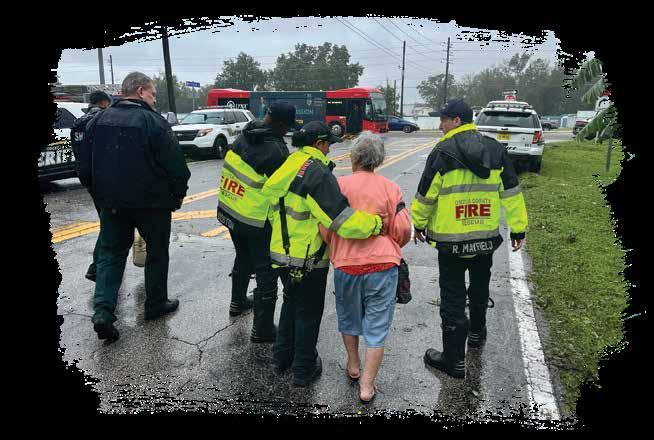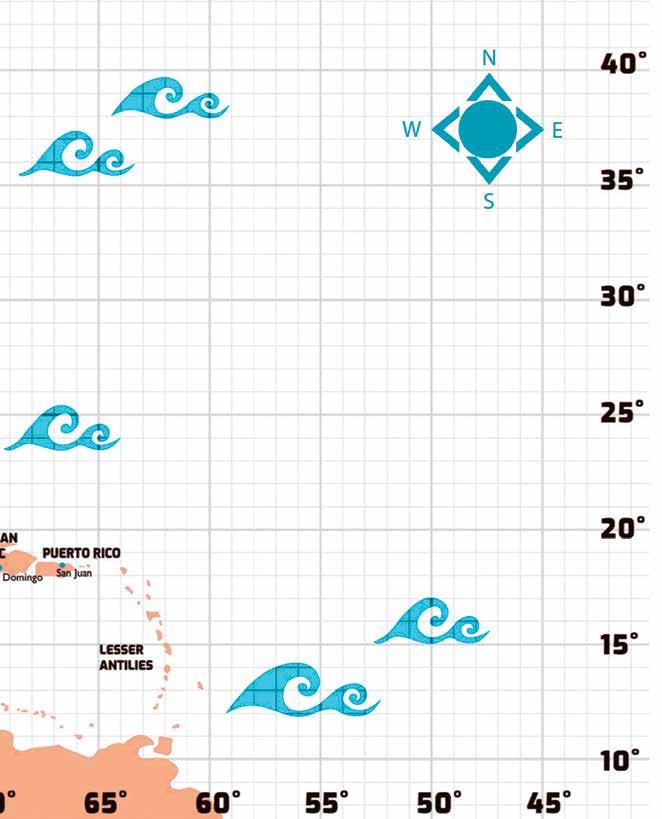
5 minute read
FAMILY MEMBERS WITH SPECIAL NEEDS
Residents with disabilities, medical problems or mobility problems who may need transportation assistance or disaster shelter during an emergency may register with the Osceola County Special Needs Program at www.readyosceola.org. Keep these considerations in mind when making plans for your loved ones who have special needs.
HOME HEALTH CARE & HOMEBOUND LIFE-SUPPORT PATIENTS


Notify your health agency where you will be during a hurricane and when care can be re-established. Contact your physician if you are home-bound and under the care of a physician, but not a home health agency. If you require respirators or other electric-dependent medical equipment, you should make prior medical arrangements with your

If you require oxygen, check with your supplier about emergency plans. If you evacuate, remember to take medications, written instructions regarding your care, your walker, wheel chair, cane or special equipment, along with your bedding.
If you do not evacuate, keep a list of the names and phone numbers of friends or family, so you can make quick arrangements to stay with them in the event of a power interruption. Also, locate the nearest hospital that can help provide emergency power for your life support equipment.
Remember that although KUA does give priority to life support customers during isolated electric outages, during a time of a widespread outage from a natural disaster, such as a hurricane, it is often impossible to give priority because of the extent of damage and the order in which power must be restored.
• A list of items that will accompany him/her if your special needs family member is evacuated, including an adequate supply of medications and special foods.
• Maps with evacuation routes highlighted.
Text And Important Elements Should Be Kept Within This Area

the event of a power interruption.
Caring For Those With Special Needs At Home
Some disabled and elderly citizens may have special needs that hinder them from being able to leave their homes during emergencies. Government and emergency personnel recognize the needs of this segment of the population. However, due to their increasing numbers, it is almost impossible to provide aid for everyone. You can be a part of a care program to offer assistance to those family members who cannot help themselves by:
• Educating and physically helping them prepare their homes and property for emergencies such as hurricanes.
• Helping them shop for their necessary supplies.
• Helping them create and post their “Family Disaster Plan Checklist” (see page 35) in a visible location as a reminder to them and others.
Special Needs Family Members In Nursing Homes
Special needs family members in nursing homes also need assistance in preparing for disasters. You can ensure the safety of your family members by inquiring if their health care providers are adequately prepared for disaster or emergency situations. These agencies should have the following:
• A disaster plan that is reviewed annually by administration and staff.
• Policies that provide for in-house emergency preparedness training for employees.
• Identification procedures for patients, such as bands or cards that indicate names, ages, medical conditions and current medications.
• Transportation services for evacuations that are renewed annually.
• Agreements with other health care providers that are renewed annually.
• Transfer forms readily available authorizing admissions into hospital facilities if necessary.

• A list of friends and family members who have agreed to help in emergency situations.
• The best and safest arrangements for special needs family members may be to bring them with you when you evacuate.
Tropical Cyclone
TEXT AND IMPORTANT ELEMENTS SHOULD BE KEPT WITHIN THIS
2023 Tropical Cyclone Names


WHAT ABOUT PETS?
What To Do With Pets
• Gather up pedigree and health records (including vaccination records) and lists of special dietary or other needs for your family’s pets. Keep this information together so you have quick access to it.
•Include contact information for your family veterinarian in the “Important Numbers and Notes” page of this handbook.
• Keep at least a one-month supply of any food and medications your pets may need, including flea and tick treatments, special shampoos, dietary supplements, etc. Label them clearly with your pet’s name and instructions for safe use of each product.
• Keep blankets, toys, and cleaning supplies including paper towels, spray bottles and trash bags in air tight bags within a plastic tote container.
• Be sure to have enough pet carriers, leashes, muzzles and any other restraining equipment you might need, and label them with your pet’s name, your name and your contact information.
• Decide ahead of time whether you will leave your pets at home, board them, or take them with you if you decide to evacuate.
Boarding
• It won’t help to board pets anywhere within the area threatened by a hurricane — they won’t be any safer than they would be at home. Choose boarding facilities well out of the threatened area, and make arrangements in advance to get your pets to that location.
• Budget for boarding costs of $20 or more per animal per night, depending on the animal’s size and special needs.
Hotels
• If you plan to keep pets with you in a hotel, motel or campground, confirm ahead of time that the facility will accept your pets.
• Study your travel map ahead of time to determine where you will be able to stop to feed, water and exercise your pet.
Staying At Home
• The safest thing to do is evacuate before a hurricane ever arrives — but if for some reason you can’t evacuate (or choose not to evacuate), make plans to keep your pets indoors until the emergency is over.
• Don’t let pets go outdoors until you’re certain it’s safe. Be sure power lines, dangerous tree limbs, wildlife and other hazards have been addressed before any family member or pet goes outdoors alone.
Shelters
Ideally, it is best for pet owners not to rely on pet-friendly shelters; they should make plans in advance to take pets with them to a location out of the threatened area. However, if no other option exists, pet-friendly shelters will serve as locations where pets and their owner can stay in the same building. Owners should bring the following supplies:
• A crate to house your pet with enough room to stand up, lie down, and stretch out
• Label crates with pet owner’s name and phone number
• Medications stored in a waterproof bag
• Food that is in a waterproof bag, water and bowls
• Blankets and toys
• Cleaning supplies including paper towels, spray bottles and trash bags
• A leash and harness collar with identification tags
• Veterinary records for each pet in an air-tight bag
Osceola County has three approved pet-friendly shelter locations:
Harmony High School 3601 Arthur J. Gallagher Blvd. Harmony, FL 34771
Liberty High School 250 Pleasant Hill Blvd. Kissimmee, FL 34746
Kissimmee Middle School 2410 Dyer Blvd.
Kissimmee, FL 34741
Specific shelter location openings are announced prior to an event.
One of the most effective ways to protect your home from potential damage caused by powerful storms is to use sandbags. Sandbags can be a simple yet highly effective method of preventing water damage during a hurricane, and they are an essential tool for anyone living in an area at risk of flooding.
Sandbags are essentially just bags filled with sand, which can be placed in strategic locations around a property to prevent floodwaters from entering. They are typically made of heavy-duty materials, such as burlap or polypropylene, which can withstand the weight of the sand and the force of the water. When placed correctly, sandbags can act as a barrier, diverting water away from the property and preventing it from seeping in.







